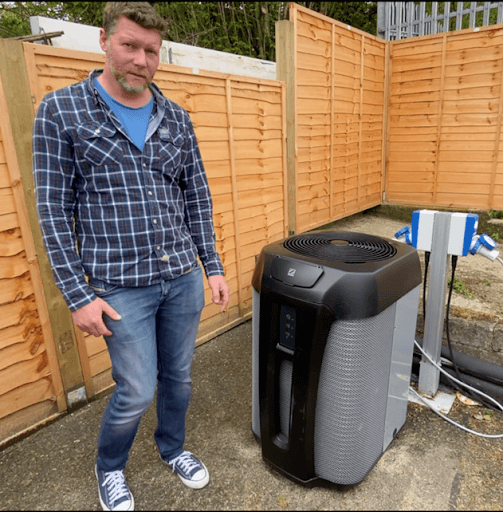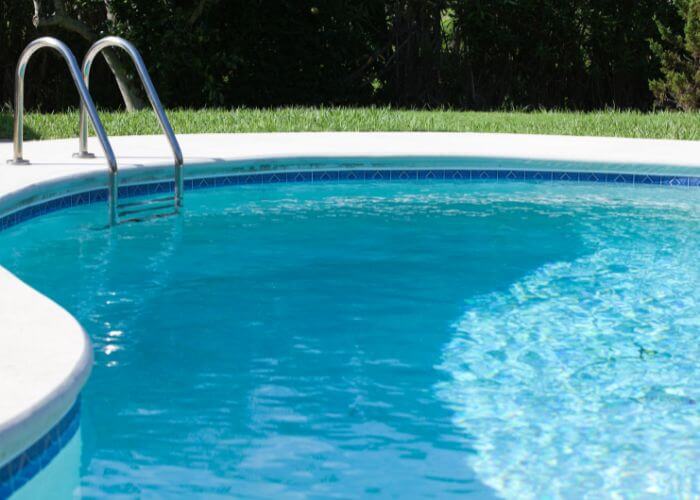Is there a Low Energy, More Eco-friendly Way to Heat Your Swimming Pool?
We spoke with James Phillpot, MD Hydrocare Swimming Pools to find out more about swimming pool heat pumps.
Hydrocare Leisure has been designing and building pools for many years, always using the latest technology and innovations. The cost of heating your pool can be expensive if the heat source is carbon based.
At this time of unprecedented rises in carbon-based energy, there has never been a better time to consider low carbon alternatives.
Learn more about what a heat pump is, how they differ from traditional hearing systems and the benefits for your swimming pool.

What is a heat pump?
Traditional boiler systems burn carbon-fuels (gas, wood pellets or electricity) to heat water that can be pumped into your pool. In contrast, heat pumps extract energy from the sun that has warmed the air or ground. The pump uses a heat exchanger that amplifies energy in a very efficient way to produce heat that can be used to heat the water for your swimming pool or home.
There are two main types of heat pump; ground source and air source.
Ground source heat pump
Ground source heat pumps require pipes to be buried underground, typically 50-100mtrs below ground.
Air source heat pump
Air source heat pumps extract heat from the air. Surprisingly, they even work at very low external temperatures of 0c or lower. They work in a similar way to an air conditioning unit, using the refrigeration process. They do not create heat, but move it from outside to inside which can be used to heat your home or pool. Heat from the air gets absorbed into the refrigerant liquid which starts to ‘boil’ as it becomes a gas. The gas is compressed which creates heat which is what is used to heat your pool.
Are heat pumps really more environmentally friendly than traditional pool heating systems?
The simple answer is YES! Both heat pump systems require low energy inputs and produce a higher energy output.
A heat pump’s energy consumption is calculated using the Coefficient of Power – Energy required to raise 1m3 of water by 1 degree. Good heat pumps have a CoP of 1 -4, meaning that for every KWH consumed 4KH of energy is applied to the swimming pool water.
Typically, these systems produce much lower CO2 emissions. Whilst both ground and air source systems do use electricity to operate, they can be used with renewable energy sources such as solar energy panels, which enhances their eco-friendly credentials.
Swimming pool heat pumps have a large heat exchanger that enables a greater water flow when the pump is running. This higher flow means the water heats at a lower temperature and as a consequence is more energy efficient.
An air source pump draws in air to the element that then compresses the ambient air temperature to produce heat. The efficiency gain can be 300-500%.
What type of swimming pool heating do Hydrocare Leisure recommend for their customers?
Whilst we maintain and can install all types of gas, electric and heat pumps, we only install new heat pumps. This has been the case for many years and has nothing to do with the recent rapid rise in energy prices. It’s just a more economical and environmentally friendly alternative.
That said, we have been inundated with requests for quotes to switch old gas and electric boilers to heat pumps as a result of the rising gas and electricity prices. We deal with every customer request individually and after taking into account all of their needs and requirements, we will recommend the best heat pump solution for their pool.
Does it get too cold in winter to use a swimming pool heat pump?
A dedicated pool heat pump works best when the air temperature is warmer. It can be used all year round but will take longer to heat a pool in the cooler months. Typically, a heat pump can take 3-5 days to heat a medium sized pool during the warmer months.
There is heat in the air all year round in the UK. Modern heat pumps can extract that temperature and compress it to produce heat. A larger pump may be required for all year round use, vs one just used in the traditional outdoor pool season.
It’s really important to use a thermal pool cover when you are heating your pool; also, whenever it’s not in use and the heat pump is on. Otherwise, you’ll end up wasting money as the heat evaporates with the surface water. The best advice is to speak with the Hydrocare team and we’ll advise you on the right solution for your circumstances and needs.
How much does a heat pump cost and is it worth the expenditure?
Put simply, you get what you pay for. At Hydrocare Leisure, we only recommend high quality, tried and tested swimming pool heat pumps; Calorex and Zodiac are our preferred and trusted suppliers.
Prices of the pumps vary depending on their size, the intended swimming season and KWh output. A 16KW summer season heat pump capable of heating a small to medium sized pool would cost £4k – £6k. There are a few variables when fitting a heat pump, hence the cost range.
The key thing to remember is that whilst a heat pump may cost more than say a similarly rated gas boiler, the output efficiency is 3-5 times HIGHER, so ongoing running costs are cheaper year after year. Added to that is the fact that heat pumps do not produce harmful carbon gases then there really is only one choice in our opinion. This is doubly so, if the heat pump system for your pool is combined with solar panels.
Are heat pumps difficult to fit?
They are less complicated to install than say an equivalent gas boiler. They do not require the fitter to be Corgi registered as is the case for a gas boiler. That said, these are expensive and reasonably complex pieces of technology that often require a concrete base and always require a qualified electrician to check the power supply and connect the unit correctly. A system bypass should be installed for maintenance to be carried out. It is recommended this is done annually.
At Hydrocare Leisure, we use our own expert engineers to fit the heat pumps. All units and works are guaranteed. We also offer after sales care and servicing for the life of the product.
Get in touch about swimming pool heat pumps
If you want to find out more about heat pumps or are interested in finding out more about this technology, contact us at Hydrocare. One of our friendly experts will be very happy to help and to answer your questions. We can even arrange a site visit to provide you with a free risk-free quote.
You can contact us by:
Email: enquiries@hydrocare.co.uk
Phone: 01444 236578
You can find out more about our services by following these links:
Facebook: www.facebook.com/hydrocareleisureltd
Instagram: www.instagram.com/hydrocareleisureltd/
YouTube: www.youtube.com/hydrocareleisurechannel/
You can get more information about heat pumps from these websites:

